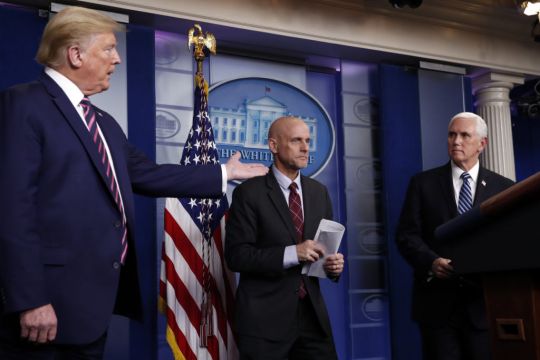White House chief of staff Mark Meadows on Friday pressed Food and Drug Administration chief Stephen Hahn to grant an emergency use authorisation for Pfizer’s coronavirus vaccine by the end of the day or face possible firing, according to two administration officials.
The vaccine produced by Pfizer Inc and its German partner BioNTech won a critical endorsement on Thursday from an FDA panel of outside advisers, and sign-off from the agency — which was expected this weekend — is the next step needed to deliver the shots to the public.
Mr Meadows spoke to Dr Hahn by telephone on Friday, according to a senior administration official who spoke to The Associated Press on condition of anonymity.
The chief of staff also told Dr Hahn his job was in jeopardy if the emergency use authorisation was not issued before Saturday, said a second administration official also familiar with the conversation, with the ultimatum understood to have come at President Donald Trump’s direction.
Dr Hahn signalled that he would tell regulators to allow the vaccine to be issued on an emergency basis, the official said.

Friday’s threat marked the latest attempt by the Trump administration to override government scientists working to combat the deadly pandemic.
Even with an FDA decision expected within hours, Mr Trump and his deputies proved unwilling to let regulators work through their careful review, which includes drafting safety warning labels and instructions for physicians.
It was unclear if authorising the vaccine on Friday night would meaningfully expedite the vaccine’s rollout.
Mr Trump tweeted directly at Dr Hahn earlier on Friday, complaining that the FDA “is still a big, old, slow turtle”. Mr Trump has publicly lambasted the pace of the FDA’s vaccine review process.
“Get the dam vaccines out NOW, Dr. Hahn,” Mr Trump tweeted. “Stop playing games and start saving lives.”
Dr Hahn disputed characterisations of his conversation with Mr Meadows.
“This is an untrue representation of the phone call with the Chief of Staff,” Dr Hahn said in a statement.
“The FDA was encouraged to continue working expeditiously on Pfizer-BioNTech’s EUA request. FDA is committed to issuing this authorization quickly, as we noted in our statement this morning.”
The FDA said earlier on Friday it “will rapidly work” to grant emergency use of the vaccine.
Ashish Jha, dean of Brown University’s school of public health, called the pressure an “unforced error” by the White House that could chip away at public confidence in a vaccine.
“It creates a veneer of political meddling,” Dr Jha said. “Every time you see the president get involved, you see vaccine confidence drop by 10%.”
Dr Hahn and other top health officials have been working for months to boost public confidence in the government’s vaccine effort, which will eventually need to reach most Americans to suppress the virus.
Recent polls show only about half of all Americans are ready to roll up their sleeves for a shot. Many have safety concerns and want to wait and see how the initial rollout fares. But concerns that a vaccine was rushed due to political pressure could further undermine the unprecedented vaccination effort.

“The last thing this process needs now is to undermine the public’s faith in the vaccine with political pressure to hurry up an already rushed process with threats of firings,” said Carl Tobias, law professor at the University of Richmond in Virginia.
Dr Jha added that FDA officials did not need the added pressure.
“They already feel the weight of what’s happening in our country,” he said.
Mr Trump’s frustration with the FDA has been mounting, particularly as other countries have beaten the US in issuing emergency approvals for the vaccine.
The FDA decision — when it comes — will kickstart an unprecedented vaccination campaign needed to eventually defeat the virus, now blamed for nearly 300,000 deaths in the US.
And the agency’s greenlight of the vaccine was virtually assured after Thursday’s positive vote by agency advisers.
The FDA’s review is critical to assuring the safety and effectiveness of a vaccine that will eventually be given to many millions of Americans.
Among the final issues facing FDA scientists are whether to authorise the shot for use in pregnant women and teenagers, who were not extensively studied in Pfizer’s trial.
The agency’s careful approach is unique around the world in that the FDA actually reanalyses all company data to verify its accuracy. That differs from the abbreviated process used by the UK and other countries, which rely on summary data produced by manufacturers.
Dr Hahn has stated for months that “science, not politics” would determine when the agency gives the vaccine the go-ahead.







